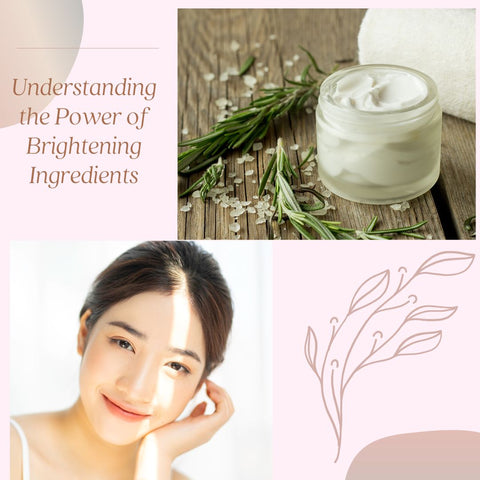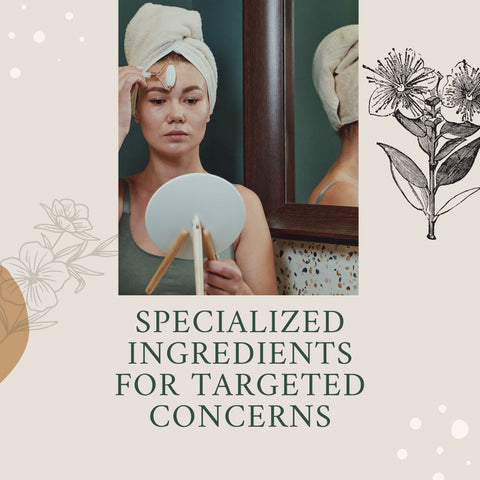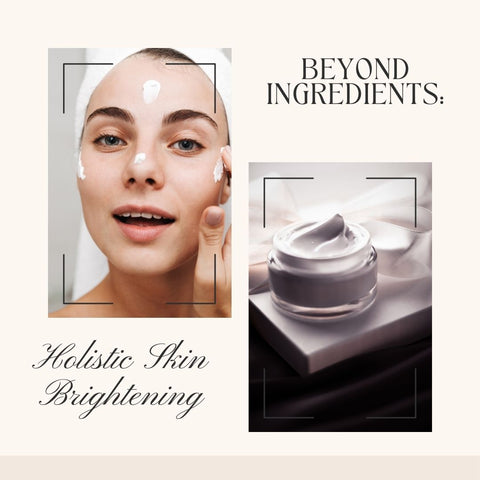Brightening chemicals are regularly incorporated into skincare routines to achieve radiant skin. We'll examine a few unusual yet well-known brightening substances in this blog.
Understanding the Power of Brightening Ingredients

In skincare, brightening chemicals are essential since they aid with pigmentation, uneven tone, and dullness, among other issues with the skin. Knowing the potential of these substances can help you choose products that are tailored to your unique skin type. An outline of the main brightening chemicals and their advantages can be found in this blog. Knowing how these brightening chemicals function can help you make product selections that support your skincare objectives. Remember that each person may react differently to these components, so it's best to conduct patch testing before adding new products to your regimen. Furthermore, the key to optimising the advantages of brightening chemicals and preserving a beautiful complexion is constant application and sun protection.
The Magic of Vitamin C: More Than Just Brightening
Ascorbic acid, another name for vitamin C, is a potent and adaptable ingredient in skincare products that has advantages beyond skin brightening. Antioxidant protection, collagen synthesis, brightening and hyperpigmentation, anti-inflammatory qualities, wound healing, protection against sun damage, improvement of other actives, decrease in oxidative stress, prevention of photoaging, hydration, management of skin conditions, and general skin health are just a few of the amazing effects and roles of vitamin C in skincare. Due to its many benefits, vitamin C is a great addition to many skincare formulations, whether the goal is to reduce inflammation, prevent premature ageing, or target hyperpigmentation.
Retinol: The Anti-Aging Warrior
Retinol, a vitamin A derivative, is commonly referred to as the "anti-aging warrior" in the skincare industry due to its remarkable benefits in combating ageing symptoms. Here's why retinol is regarded as a strong ally in the fight against ageing:
-
Collagen Synthesis: Retinol stimulates the synthesis of collagen, a structural protein that gives the skin firmness and elasticity. Collagen production declines with age, resulting in the formation of fine lines and wrinkles.
-
Reduction of Fine Lines and Wrinkles: By stimulating collagen production and increasing cell turnover, retinol helps to reduce the appearance of fine lines and wrinkles. It promotes smoother, younger-looking skin.
-
Cell Turnover Acceleration: Retinol increases cell turnover by encouraging the shedding of old, damaged skin cells and the growth of new, healthier cells. This process results in improved skin texture and a more radiant complexion.
-
Increased Skin Thickness: Retinol has been shown to increase skin thickness by stimulating the growth of new skin cells. Thicker skin is more resilient and less likely to develop fine lines.
-
Evening Out Skin Tone: Retinol inhibits melanin production, which helps fade dark spots, sun damage, and hyperpigmentation. This produces a more even skin tone and reduces the appearance of sun-induced discoloration.
-
Pore Minimization: Retinol has a pore-refining effect, which helps to reduce the appearance of large pores. This results in a smoother skin texture.
-
Enhancement of Skin Texture: Retinol enhances the overall texture of the skin by stimulating collagen synthesis and cell turnover. It can smooth out rough or uneven skin, giving the appearance of softer, more refined skin.
-
Preventing Photoaging: Retinol aids in shielding the skin from UV ray damage, which includes sun-induced ageing. It helps to stop photoaging, which includes the formation of wrinkles and sunspots.
-
Treatment of Acne: Retinol helps clear up acne by encouraging the exfoliation of dead skin cells and inhibiting the development of comedones, or clogged pores. This makes it a valuable ingredient for those dealing with both aging and acne-prone skin.
-
Anti-Inflammatory Properties: Retinol has anti-inflammatory characteristics that may help people with inflammatory skin disorders like rosacea or acne.
-
Enhancement of Other Skincare Ingredients: When combined with other skincare ingredients, retinol can increase their effectiveness. For instance, it has a synergistic effect when combined with antioxidants such as vitamins C and E.
While retinol has many benefits, it is important to keep in mind that it can cause skin irritation, redness, or peeling. It is best to gradually increase the frequency of retinol applications in your skincare routine, beginning with low concentrations. Furthermore, since retinol can make your skin more sensitive to UV rays, you must wear sunscreen when using it in your routine. Personalised advice on retinol incorporation into your anti-aging skincare routine can be obtained by consulting with a dermatologist.
Niacinamide: Versatility in Skincare
Niacinamide, also known as vitamin B3 or nicotinamide, is a versatile and well-tolerated skincare ingredient that provides numerous benefits for a variety of skin conditions. Here's why niacinamide is renowned for its versatility in skincare.
-
Improvement in Skin Barrier Function: Niacinamide helps enhance the skin's natural barrier function, reducing water loss and maintaining optimal hydration. This is beneficial for individuals with dry or compromised skin.
-
Reduced Redness and Inflammation: Niacinamide has anti-inflammatory properties that can help relieve redness and inflammation. It is particularly useful for individuals with sensitive or irritated skin.
-
Regulation of Sebum Production: Niacinamide helps regulate sebum production, making it suitable for those with oily or acne-prone skin. It can contribute to a more balanced complexion.
-
Minimization of Pore Size: Niacinamide has been shown to reduce the appearance of enlarged pores. Regular use can lead to a smoother skin texture and minimised pores.
-
Brightening and Even Skin Tone: Niacinamide inhibits the transfer of melanin to skin cells, helping to fade dark spots and hyperpigmentation. It contributes to a more even and radiant skin tone.
-
Collagen Synthesis Support: Niacinamide supports collagen synthesis, promoting skin elasticity and firmness. This can lead to a reduction in the appearance of fine lines and wrinkles.
-
Protection Against UV Damage: Niacinamide offers antioxidant properties that help protect the skin from UV damage and environmental stressors. While not a substitute for sunscreen, it complements sun protection measures.
-
Treatment of Hyperpigmentation: Niacinamide is effective in treating various forms of hyperpigmentation, including melasma and post-inflammatory hyperpigmentation.
-
Anti-Aging Benefits: Niacinamide addresses multiple signs of aging, including fine lines, wrinkles, and loss of skin elasticity. Its broad-spectrum benefits make it suitable for anti-aging skincare routines.
-
Compatibility with Other Ingredients: Niacinamide is known for its compatibility with other skincare ingredients, allowing it to be easily incorporated into existing routines. It pairs well with retinoids, vitamin C, and hyaluronic acid.
-
Gentle on the Skin: Niacinamide is generally well-tolerated by various skin types, including sensitive skin. It is less likely to irritate, making it suitable for those who may not tolerate more aggressive skincare ingredients.
-
Environmental Damage Prevention: Niacinamide protects the skin from pollutants and oxidative stress, which improves overall skin health.
-
Rosacea Treatment: Because of its anti-inflammatory properties, niacinamide is beneficial for people who have rosacea, as it helps to reduce redness and improve skin comfort.
-
Support for Skin's Natural Repair Processes: Niacinamide supports the skin's natural repair processes, aiding in the recovery from damage and promoting overall skin resilience.
Niacinamide is a versatile ingredient found in a variety of skincare products, such as cleansers, serums, and moisturisers. Its versatility with various skin types and concerns makes it a popular choice for people looking for a comprehensive solution to healthier, more radiant skin.
Specialized Ingredients for Targeted Concerns

Specific skin issues are addressed with targeted efficacy by specialised skincare components. Hyaluronic Acid, Salicylic Acid (BHA), Glycolic Acid (AHA), Lactic Acid (AHA), Azelaic Acid, Centella Asiatica (Cica), Peptides, Vitamin E, Ferulic Acid, Ceramides, Alpha Arbutin, Licorice Extract, Resveratrol, and Retinoids (Retinol, Tretinoin) are a few noteworthy specialised ingredients for a variety of skincare concerns. It's crucial to gradually incorporate specialty ingredients into your skincare routine and conduct a patch test to be sure your skin can tolerate them. Additionally, for individualised guidance based on your unique concerns and skin type, think about scheduling an appointment with a dermatologist or skincare specialist.
Alpha Arbutin: A Gentle Approach to Hyperpigmentation
One naturally occurring substance that comes from the bearberry plant is alpha arbutin. Although it is a member of the hydroquinone derivative family, it is thought to be a more benign and safe substitute. Tyrosinase is an enzyme that is involved in the synthesis of melanin; by reducing its activity, alpha arbutin helps to diminish the appearance of dark patches and hyperpigmentation.
Benefits of Alpha Arbutin:
-
Alpha arbutin is effective in reducing the appearance of hyperpigmentation, including dark spots, sunspots, and melasma. It works by inhibiting the production of melanin in the skin.
-
By regulating melanin production, alpha arbutin helps promote a more even and uniform skin tone. It contributes to a brighter complexion and reduces the contrast between pigmented and non-pigmented areas.
-
Alpha arbutin is considered a gentler alternative to other skin-lightening agents like hydroquinone. It is well-tolerated by various skin types, including sensitive skin.
-
Unlike some other hyperpigmentation treatments, alpha arbutin is considered safe for long-term use. It does not pose the same risks associated with prolonged use of hydroquinone.
-
Alpha arbutin is more stable than other arbutin derivatives, making it ideal for use in skincare formulations. Its stability guarantees that it will remain effective in products over time.
-
Alpha arbutin has antioxidant properties, which can help protect the skin from oxidative stress and environmental damage.
-
Alpha arbutin is water-soluble, making it ideal for hydrating skincare formulations. It can help maintain skin hydration levels.
-
Alpha arbutin is compatible with a variety of skincare ingredients, making it easy to incorporate into different skincare routines. It can be combined with other ingredients such as vitamin C and hyaluronic acid.
How to Use Alpha Arbutin:
-
Use alpha arbutin as part of your regular skincare routine, typically in serums, creams, or other targeted treatments.
-
Use alpha arbutin on clean, dry skin. Apply a small amount to the affected areas or all over the face, depending on your skincare goals.
-
Follow up with a moisturiser to lock in hydration.
-
Always use sunscreen during the day, especially when using products targeting hyperpigmentation. Sunscreen helps prevent further darkening of existing spots and protects the skin from UV damage.
-
Results may take time, so be patient and consistent with your skincare routine.
Kojic Acid: Unlocking a Radiant, Even Skin Tone
Kojic acid is a naturally occurring substance derived from various fungi, particularly Aspergillus oryzae, and is a byproduct of the fermentation process in the production of sake (Japanese rice wine). In skincare, kojic acid is used for its skin-brightening properties.
Benefits of Kojic Acid:
-
Kojic acid inhibits the activity of tyrosinase, an enzyme involved in melanin production. By reducing melanin synthesis, it helps fade dark spots, melasma, and hyperpigmentation, promoting a more even skin tone.
-
Kojic acid is known for its skin-brightening effect. Regular use can contribute to a more radiant complexion and a reduction in dullness.
-
Kojic acid works on uneven skin tone, helping to balance pigmentation and reduce the appearance of areas with excessive melanin.
-
Kojic acid has antioxidant properties that can help protect the skin from free radical damage caused by UV radiation and environmental stressors.
-
The primary mechanism of action for kojic acid is the inhibition of tyrosinase, an enzyme crucial for the production of melanin. By interfering with this process, kojic acid helps control pigmentation.
-
Kojic acid is generally considered safe for use on different skin types, although individuals with sensitive skin may want to perform a patch test before widespread use.
-
Sun exposure can lead to the development of dark spots and hyperpigmentation. Kojic acid can help address these concerns and is often included in formulations targeting sun-induced pigmentation.
How to Use Kojic Acid:
-
Look for skincare products such as serums, creams, or spot treatments that contain kojic acid.
-
Before incorporating a new product into your routine, especially if it contains kojic acid, perform a patch test to ensure compatibility and avoid potential irritation.
-
Use kojic acid on clean, dry skin. Apply a small amount to the affected areas or all over the face, depending on your skincare goals.
-
Kojic acid can make the skin more sensitive to sunlight. Always use sunscreen during the day, even on cloudy days, to prevent further pigmentation and protect the skin.
-
Results may take time, so be consistent with your skincare routine. It's important to use kojic acid as directed and to be patient for noticeable changes.
Combining Ingredients for Maximum Effect
Strategically combining skincare ingredients can increase their effectiveness while also addressing multiple concerns. However, it is critical to exercise caution and be aware of potential interactions. Here are some ingredients that combine well for maximum effect:
-
Vitamin C and E: This combination increases antioxidant protection. Vitamin C brightens the skin and protects against free radicals, whereas vitamin E stabilises and enhances the effects of vitamin C.
-
Retinol and Niacinamide: Retinol promotes skin renewal and collagen synthesis, which helps to reduce the signs of ageing. Niacinamide soothes and moisturises the skin, lowering the risk of irritation caused by retinol.
-
Hyaluronic Acid and Vitamin C: Hyaluronic acid moisturises and plumps the skin, whereas vitamin C brightens and protects against free radicals. Together, they help to create a more radiant and youthful complexion.
-
Alpha Arbutin and Kojic Acid: Both ingredients target hyperpigmentation and dark spots. Combining them can enhance their skin-brightening effects for a more even skin tone.
-
Glycolic Acid and Retinol: Glycolic acid exfoliates the skin, promoting cell turnover, while retinol addresses fine lines and wrinkles. This combination can lead to smoother, more rejuvenated skin.
-
Peptides and Hyaluronic Acid: Peptides support collagen synthesis, while hyaluronic acid hydrates. Together, they contribute to firmer, more supple skin.
-
Azelaic Acid and Salicylic Acid: Azelaic acid has anti-inflammatory and brightening properties, while salicylic acid exfoliates within the pores. This combination can be effective for addressing acne and post-inflammatory hyperpigmentation.
-
Niacinamide and Licorice Extract: Both ingredients have anti-inflammatory and brightening properties. Combining them can help soothe the skin and reduce hyperpigmentation.
-
Vitamin C and Ferulic Acid: Ferulic acid enhances the stability and effectiveness of vitamin C. Together, they provide potent antioxidant protection against environmental damage.
-
Retinol and Hyaluronic Acid: Combining retinol with hyaluronic acid can help mitigate potential dryness or irritation associated with retinol use. Hyaluronic acid provides hydration, supporting overall skin health.
-
Niacinamide and Zinc: Niacinamide helps control sebum production and soothe the skin, while zinc provides additional oil-regulating benefits. This combination is suitable for those with oily or acne-prone skin.
-
Alpha Hydroxy Acids (AHAs) and Vitamin C: AHAs exfoliate the skin, whereas vitamin C brightens. This combination can result in smoother, more radiant skin.
Every person's skin is different, so what works for one may not work for another. Customising your skincare routine according to your skin type, concerns, and sensitivities is critical for achieving the best results.
Building a Brightening Skincare Routine

Developing a brightening skincare regimen entails using products and substances that address uneven skin tone, dullness, and hyperpigmentation. Using a gentle cleanser, exfoliation (two to three times a week), vitamin C serum in the morning, hyaluronic acid serum, niacinamide serum, alpha arbutin or kojic acid treatment, retinoid (night, two to three times a week), moisturiser, and sunscreen in the morning, you can create an effective brightening routine. Recall that creating a skincare regimen is a customised process; hence, what suits one individual may not suit another. Pay attention to your skin's needs, see how products affect it, and modify as necessary. It is advised that you consult a specialist if your skin troubles are ongoing.
Layering Skincare Products for Optimal Results
The right order of layering skincare products guarantees maximum absorption and efficacy. Including Cleanser, Toner (Optional), Exfoliant (Twice to Three Times a Week), Treatment Serums, Hyaluronic Acid Serum, Retinol or Retinoid (Night, Twice to Three Times a Week), Eye Cream, Moisturiser, and Sunscreen (Morning), here's guidance on how to layer skincare products for optimal results. Recall that not every product is required for every person. Tailor your regimen to your interests, concerns, and skin type. It's best to seek individualised counsel from a dermatologist if you have specific skincare concerns.
Nighttime Rituals: Boosting Skin Renewal
Enhancing skin regeneration through a nighttime skincare routine is crucial for encouraging cell turnover, mending the skin, and taking care of a variety of issues. This is a guide to a good bedtime regimen that includes sleep masks, optional treatments, eye cream, hyaluronic acid serum, moisturiser, gentle cleansing, exfoliation (three to five times a week), treatment serums (retinoid or retinoid and peptide), and moisturiser (two to three times a week).
Tips:
-
For the best results, maintain your nighttime routine consistently.
-
If you are using active ingredients like retinol, you should apply sunscreen in the morning to protect your skin from UV damage.
-
If you are experiencing irritation or excessive dryness, change the frequency or concentration of certain products.
-
If you have specific skin concerns or conditions, consult a dermatologist for personalised recommendations.
A consistent nighttime skin renewal ritual can help improve overall skin health while also addressing specific concerns over time. Customise the routine to your specific needs and preferences, and be patient for noticeable results.
Preventing Irritation: Tips for Sensitive Skin
Preventing irritation is critical for those with sensitive skin. Here are some tips for caring for sensitive skin and reducing the risk of irritation:
-
Patch Test New Products: Before using a new skincare product on your face, test it on a small, inconspicuous area to see if there are any adverse reactions. Apply a small amount of the product behind your ear or to your forearm and wait 24-48 hours to see if you experience any redness, itching, or irritation.
-
Choose Gentle Cleansers: Select fragrance-free, gentle cleansers with a short ingredient list. Avoid using harsh chemicals or fragrances that can strip the skin and cause irritation.
-
Use Lukewarm Water: Wash your face with lukewarm water rather than hot water. Hot water can strip the skin of natural oils, leading to dryness and irritation.
-
Avoid Harsh Ingredients: Ingredients to Steer Clear of: Alcohol, Fragrances, and Strong Acids (such Glycolic and Salicylic Acid). Sensitive skin may become irritated by these substances. Select items with the labels "gentle" and "fragrance-free."
-
Moisturise Regularly: Use a hypoallergenic, fragrance-free moisturizer. Keep the skin hydrated to prevent dryness and irritation. Look for ingredients like hyaluronic acid or glycerin.
-
Choose Products for Sensitive Skin: Items to Look for include hypoallergenic formulations, items labelled for sensitive skin, and products with less components. The purpose of these products is to reduce the possibility of allergies and irritation.
-
Protect from UV Rays: Use a broad-spectrum, mineral-based sunscreen. Choose a sunscreen with SPF 30 or higher. Sun exposure can trigger sensitivity, so sun protection is crucial. Mineral sunscreens with zinc oxide or titanium dioxide are often well-tolerated by sensitive skin.
-
Limit Exfoliation: Reduce the frequency of exfoliation. Choose mild exfoliants like a gentle scrub or enzyme-based exfoliator. Over-exfoliation can worsen sensitivity, so it's best to limit this step.
-
Manage Stress: Practice stress-reducing activities like meditation, yoga, or deep breathing. Stress can exacerbate skin conditions, so managing stress is essential for maintaining skin health.
-
Stay Hydrated and Eat Well: Drink plenty of water. Consume a balanced diet rich in antioxidants and nutrients. Hydration and a healthy diet contribute to overall skin health.
-
Consult a Dermatologist: If you experience persistent or severe sensitivity. A dermatologist can provide personalised recommendations and identify any underlying skin conditions.
-
Read Product Labels: Check for alcohol, fragrance, parabens and sulphates. Being aware of potential irritants allows you to make informed decisions.
-
Natural Fibers for Clothing: Wear clothing made from natural fibers like cotton. Natural fibers are less likely to irritate compared to synthetic materials.
-
Avoid Overheating: Hot baths or showers, especially for extended periods. Overheating the skin can contribute to sensitivity.
-
Be Patient and Consistent: Improvements may take time. Consistency with a gentle routine is key to preventing irritation and maintaining skin health.
Keep in mind that every person has a different type of skin, so what works for one may not work for another. It is best to seek individualised advice from a dermatologist if you have ongoing sensitivity or specific skin concerns.
Beyond Ingredients: Holistic Skin Brightening

Using a holistic approach to skin lightening entails more than just using certain chemicals. To encourage glowing and balanced skin, it takes into account lifestyle choices, general health, and mindful exercises. A balanced diet, adequate hydration, stress management, adequate sleep, regular exercise, sun protection, abstaining from smoking and alcohol, gentle skincare practices, holistic therapies, mindful product selection, frequent dermatological check-ups, cautious lifestyle choices, adopting a positive mindset, limiting sugar and processed foods, and customising your routine are some holistic tips for achieving skin brightening. Over time, combining these lifestyle choices with focused skincare can help to achieve a complexion that is bright and balanced in tone.
The Role of Diet and Lifestyle in Skin Health
Skin health is greatly influenced by diet and lifestyle choices. Skin health is frequently a good indicator of general health. A nutrient-rich diet, plenty of water, a reduction in processed foods and sugar, healthy fats, stress management, enough sleep, regular exercise, sun protection, moderation in alcohol consumption and abstinence from smoking, holistic therapies, balanced lifestyle choices, optimistic outlook, and routine customisation are all important factors to take into account. Including these lifestyle elements in your everyday activities can help you maintain better skin. Remember that every person will react differently, so it's critical to strike a balance that suits your particular requirements and tastes.
Customising Your Skincare Plan
Tailoring your skincare regimen to your specific skin type is crucial for addressing your specific requirements and issues. This is a step-by-step guide that will assist you in creating a customised skincare routine. It covers topics like determining your skin type, evaluating your skin concerns, choosing core products, adding targeted treatments, thinking about additional treatments, frequency of use, patch testing, observing and adjusting, consulting a professional, staying informed, and consistency is key. You can design a programme that addresses specific issues and promotes general skin health by concentrating on your own needs and preferences.
Advanced Treatments and Future Trends in Skin Brightening
Future developments in skin brightening trends and advanced treatments will keep evolving along with technology and research. Innovative topical agents, microdermabrasion and chemical peels, laser and light therapies, advanced dermaceuticals, medical-grade cosmeceuticals, genetic and epigenetic skincare, microbiome-friendly skincare, advanced delivery systems, artificial intelligence and virtual dermatology, cryotherapy and cryofacials, and sustainable and clean beauty are some cutting-edge treatments and emerging trends in the field of skin brightening. More customised skincare regimens and a better comprehension of the relationship between heredity, lifestyle, and skin health are anticipated future developments. For advice on advanced treatments, always seek the advice of dermatologists or skincare specialists.
















